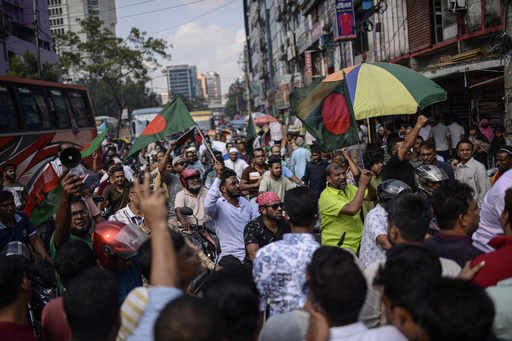
DHAKA, Bangladesh — On Sunday, opposition groups led by former Prime Minister Khaleda Zia managed to prevent the Awami League party from staging a rally in Dhaka, a gathering significant for its potential to signify a resurgence in street politics since Sheikh Hasina left the country in August amidst widespread protests.
The Bangladesh Nationalist Party (BNP) had organized the rally to honor the memory of a party activist who died on November 10, 1987, an event that ignited mass demonstrations against H.M. Ershad, the then military ruler, who was eventually removed from power, ending his nine-year regime in 1990.
This date is recognized as “democracy day” in Bangladesh, marking the shift from a presidential system to a parliamentary democracy in 1991. Since this transition, Sheikh Hasina and her political opponent Khaleda Zia have emerged as the two dominant figures in the nation’s political landscape.
On the scheduled day of the rally, Zia’s supporters, along with members of the Jamaat-e-Islami party, gathered en masse in Dhaka, effectively occupying the designated rally site. Additionally, hundreds of students affiliated with the Anti-discrimination Student Movement, which played a key role in the recent protests, vowed to prevent Hasina’s detractors from gathering, accusing them of attempting to reclaim power through street demonstrations.
Supporters of the Awami League were met with resistance as they tried to convene at their headquarters near Noor Hossain Square, where confrontations ensued. Witnesses and reports indicated that supporters of the BNP actively attempted to disrupt the gathering, with chants and rallies in support of Zia being heard throughout the area.
The Awami League reported that multiple activists were apprehended by the police amid the unrest, asserting that they faced physical violence from anti-Hasina protesters. As the day progressed, tensions escalated, with hostile groups asserting they would not permit any form of gathering by Hasina’s supporters.
In response to the chaos, the Awami League took to social media, posting videos that depicted their supporters facing aggression. Their headquarters had previously suffered vandalism following Hasina’s departure from office on August 5, and on this day, it stood largely unoccupied, bearing signs of damage while rival factions took control of the area.
The political atmosphere remains volatile in Bangladesh as Zia’s party pushes for rapid reforms and calls for new elections under a transitional government led by Nobel Peace laureate Muhammad Yunus. The BNP is optimistic about its potential to take control in the absence of Hasina’s party, alongside its other coalition partners who also face difficulties.
Meanwhile, the government under Yunus has indicated it will pursue the extradition of Hasina and her close associates, who face accusations of human rights violations connected to the deaths of numerous protesters during the recent turmoil.
